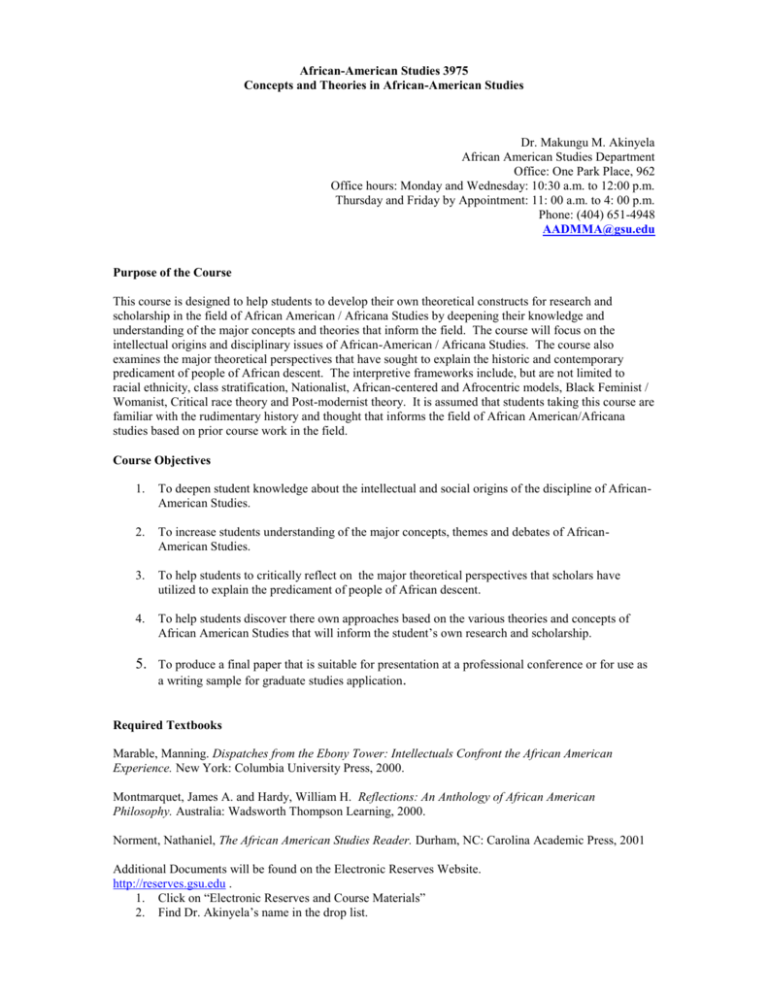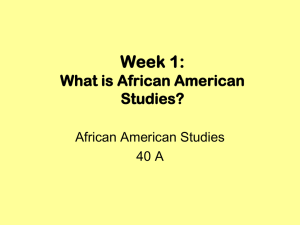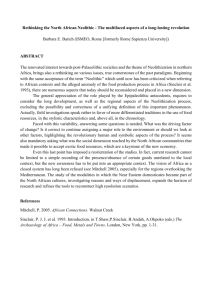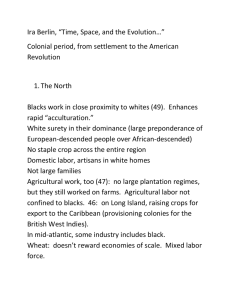African-American Studies 3975: Concepts and Theories
advertisement

African-American Studies 3975 Concepts and Theories in African-American Studies Dr. Makungu M. Akinyela African American Studies Department Office: One Park Place, 962 Office hours: Monday and Wednesday: 10:30 a.m. to 12:00 p.m. Thursday and Friday by Appointment: 11: 00 a.m. to 4: 00 p.m. Phone: (404) 651-4948 AADMMA@gsu.edu Purpose of the Course This course is designed to help students to develop their own theoretical constructs for research and scholarship in the field of African American / Africana Studies by deepening their knowledge and understanding of the major concepts and theories that inform the field. The course will focus on the intellectual origins and disciplinary issues of African-American / Africana Studies. The course also examines the major theoretical perspectives that have sought to explain the historic and contemporary predicament of people of African descent. The interpretive frameworks include, but are not limited to racial ethnicity, class stratification, Nationalist, African-centered and Afrocentric models, Black Feminist / Womanist, Critical race theory and Post-modernist theory. It is assumed that students taking this course are familiar with the rudimentary history and thought that informs the field of African American/Africana studies based on prior course work in the field. Course Objectives 1. To deepen student knowledge about the intellectual and social origins of the discipline of AfricanAmerican Studies. 2. To increase students understanding of the major concepts, themes and debates of AfricanAmerican Studies. 3. To help students to critically reflect on the major theoretical perspectives that scholars have utilized to explain the predicament of people of African descent. 4. To help students discover there own approaches based on the various theories and concepts of African American Studies that will inform the student’s own research and scholarship. 5. To produce a final paper that is suitable for presentation at a professional conference or for use as a writing sample for graduate studies application. Required Textbooks Marable, Manning. Dispatches from the Ebony Tower: Intellectuals Confront the African American Experience. New York: Columbia University Press, 2000. Montmarquet, James A. and Hardy, William H. Reflections: An Anthology of African American Philosophy. Australia: Wadsworth Thompson Learning, 2000. Norment, Nathaniel, The African American Studies Reader. Durham, NC: Carolina Academic Press, 2001 Additional Documents will be found on the Electronic Reserves Website. http://reserves.gsu.edu . 1. Click on “Electronic Reserves and Course Materials” 2. Find Dr. Akinyela’s name in the drop list. 3. 4. 5. 6. 7. Click “Go” next to Dr. A’s name. Click on the course page. Enter the password: AA3975VML Agree to the copyright. scroll to the article you want. CLASS REQUIREMENTS: Class Facilitation Each student will lead the class in discussion of a minimum of one class reading. The student will also include the submission of a summary of the assigned readings. This summary will include an overview of the reading and will include pertinent “thinking” questions that may occur to you as you read. These questions will be used to stimulate class discussion. Reflection Paper The purpose of this paper is to assist the student to comprehend the required readings. The paper will ask and answer at least three questions about the theories and concepts discussed as well as provide a critique of the readings related to the subject area. The paper should be 2-3 double-spaced typed pages and is due at the beginning of class on the appropriate day. Essay Papers Each student will write two essays on topics selected by the instructor. The mid-term paper (Due Oct. 20, 2003) will be approximately 5-8 pages double-spaced, twelve-point type. The final paper (Due Dec. 9, 2002) will be eight to twelve pages in length. Each paper will include appropriate references and will be written according to APA style guidelines. Our goal with the production of these essays is to produce academic quality work that may be considered for presentation at the National Council on Black Studies annual student competition as well as other academic presentation opportunities. Presentation of Final Paper Final papers will be presented to the class during the final two weeks of school. This presentation will give you the opportunity to get feedback and sharpen your work both technically and in content. Evaluation and Scoring of Work Class facilitation Reflection Papers (7) Midterm Essay End-term Essay Paper Presentation Total 05 Points 35 Points 25 Points 25 Points 10 Points 100 Points Late assignments will be penalized five points per day. Throughout the semester students will have opportunities to complete extra credit assignments (two points). Make-ups for extra credit assignments are not permitted. Aug. 23: Course Introduction Intellectual and social origins of African-American Studies Aug 25: Manning Marable, “Introduction: Black Studies and the Racial Mountain”, Dispatches from the Ebony Tower: Intellectuals Confront the African American Experience, Manning Marable, Editor. New York: Columbia University Press, 2000. 2 Harris, Robert L., Jr. “The Intellectual and Institutional Development of African Studies”, The African American Studies Reader, Nathaniel Norment Jr., Editor, Durham: Carolina Academic Press, 2001. Aug. 30 Film Sept. 1: Begin Student lead discussions Delores P. Aldridge and Carlene Young, “Historical Development and Introduction to the Academy”, Out of the Revolution: The Development of Africana Studies, Lexington Books, New York: 2000 .Clark-Hine, Darlene, “The Black Studies Movement: Afrocentric-Traditionalist-feminist Paradigms for the Next Stage”, The African American Studies Reader, Nathaniel Norment Jr., Editor, Durham: Carolina Academic Press, 2001. Sept. 6: Disciplinary Issues and Controversies Sept. 8: Intellectual and social origins of African-American Studies reflection due. Daniels, Philip T.K., “Black Studies: Discipline or Field of Study,” The African American Studies Reader, Nathaniel Norment Jr., Editor, Durham: Carolina Academic Press, 2001. Karenga, Maulana, “Black Studies: A Critical Reassessment”, Dispatches from the Ebony Tower: Intellectuals Confront the African American Experience, Manning Marable, Editor. New York: Columbia University Press, 2000. Sept. 13: Jennings, James, “Theorizing Black Studies: The Continuing Role of Community Service in the Study of Race and Class” Dispatches from the Ebony Tower: Intellectuals Confront the African American Experience, Manning Marable, Editor. New York: Columbia University Press, 2000. Gates and Marable, “A Debate on Activism in Black Studies”, Dispatches from the Ebony Tower: Intellectuals Confront the African American Experience, Manning Marable, Editor. New York: Columbia University Press, 2000. . Sept. 15: Delores Aldridge, “Womanist Issues in Black Studies: Towards Integrating Africana Women in Africana Studies,” The African American Studies Reader, Nathaniel Norment Jr., Editor, Durham: Carolina Academic Press, 2001. Sept. 20: 3 LeMelle, Tilden, “The Status of Black Studies in the Second Decade: The Ideological Imperative”, The African American Studies Reader, Nathaniel Norment Jr., Editor, Durham: Carolina Academic Press, 2001. Racial Ethnicity Theories and Concepts. Sept. 22: Disciplinary Issues and Controversies Reflection Due. Omi, Michael and Winant, Howard, “Racial Formation”, Racial Formation in the United States: From the 1960s to the 1990s, New York: Rutledge Press, 1994 Sept. 27: Omi, Michael and Winant, Howard, “The Racial State”, Racial Formation in the United States: From the 1960s to the 1990s, New York: Rutledge Press, 1994 Sept. 29: Bell, Derrick, “Racial Realism – After We’re Gone: Prudent Speculations on America in a Post-Racial Epoch”. Reflections: An Anthology of African American Philosophy. James A. Montmarquet and William H. Hardy, Editors. Australia: Wadsworth Thomson Learning, 2000. Class Stratification Theories and Concepts. Oct. 4: Racial Ethnicity Theories and Concepts Reflection Due. Lecture on Class Stratification Theory: Dr. A Oct. 6: Omi, Michael and Winant, Howard, “Class”, Racial Formation in the United States: From the 1960s to the 1990s, New York: Rutledge Press, 1994 Fletcher, Bill, “Black Studies and the Question of Class”, Dispatches from the Ebony Tower: Intellectuals Confront the African American Experience, Manning Marable, Editor. New York: Columbia University Press, 2000. Oct. 11: Wilson, Julius, readings from The Declining Significance of Race: Blacks and Changing American Institutions., Chicago: University of Chicago Press, 1978. Moody-Adams, Michele M., “Race, Class, and the Social Construction of Self-Respect”, Reflections: An Anthology of African American Philosophy. James A. Montmarquet and William H. Hardy, Editors. Australia: Wadsworth Thomson Learning, 2000. Oct. 13: 4 Fernandez, Johanna, “The Fire this Time: Harlem and It’s Discontents at the Turn of the Century”, Dispatches from the Ebony Tower: Intellectuals Confront the African American Experience, Manning Marable, Editor. New York: Columbia University Press, 2000. Mid-term paper due. Nationalist Theories and Concepts Oct. 18: Class Stratification Theories and Concepts Reflection Due. Lecture on Black Nationalism by Dr. Akinyele Umoja Oct. 20: Omi, Michael and Winant, Howard, “Nation”, Racial Formation in the United States: From the 1960s to the 1990s, New York: Rutledge Press, 1994Omi and Winant: pp. 36-47 and pp. 95-136. Malcolm X, “Message to the Grassroots”, Reflections: An Anthology of African American Philosophy. James A. Montmarquet and William H. Hardy, Editors. Australia: Wadsworth Thomson Learning, 2000. Oct. 25: Neal, Larry, “The Black Arts Movement”, Reflections: An Anthology of African American Philosophy. James A. Montmarquet and William H. Hardy, Editors. Australia: Wadsworth Thomson Learning, 2000. Oct. 27: Womanist / Feminist Theories and Concepts Nov. 1: Nationalist Theories and Concepts Reflection Due. Lecture on Black Womanism and Feminism by Dr. Layli Phillips. Nov. 3: Hooks, bell, “Reflections on Race and Sex”, Reflections: An Anthology of African American Philosophy. James A. Montmarquet and William H. Hardy, Editors. Australia: Wadsworth Thomson Learning, 2000. Hill-Collins, Patricia, “The Social Construction of Black Feminist Thought”, Reflections: An Anthology of African American Philosophy. James A. Montmarquet and William H. Hardy, Editors. Australia: Wadsworth Thomson Learning, 2000. Nov. 8: Harris, Angela P., “Race and Essentialism in Feminist Legal Theory”, Reflections: An Anthology of African American Philosophy. James A. Montmarquet and William H. Hardy, Editors. Australia: Wadsworth Thomson Learning, 2000. Nov. 10: 5 Hull, Gloria T. and Smith, Barbara, “The Politics of Black Women’s Studies”, Reflections: An Anthology of African American Philosophy. James A. Montmarquet and William H. Hardy, Editors. Australia: Wadsworth Thomson Learning, 2000. Afrocentric and African Centered Theories and Concepts Nov. 15: Womanist / Feminist Theories and Concepts Reflection Due. Lecture on Afrocentricity by TBA Nov. 17: Ya Azibo, Daudi Ajani, “Articulating the Distinction Between Black Studies and the Study of Blacks: The Fundamental Role of Culture and the African-Centered Worldview, The African American Studies Reader, Nathaniel Norment Jr., Editor, Durham: Carolina Academic Press, 2001. Asante, Molefi, “The Afrocentric Idea in Education”, Reflections: An Anthology of African American Philosophy. James A. Montmarquet and William H. Hardy, Editors. Australia: Wadsworth Thomson Learning, 2000. Nov. 22: Ransby, Barbara, “Afrocentrism, Cultural Nationalism, and the Problem with Essentialist Definitions of Race, Gender, and Sexuality”. Dispatches from the Ebony Tower: Intellectuals Confront the African American Experience, Manning Marable, Editor. New York: Columbia University Press, 2000. Nov. 24: No School Nov. 28 Akinyela, Makungu, M., “Rethinking Afrocentricity: The Foundation of a Theory of Critical Africentricity” Culture and Difference: Critical Perspectives on the Bicultural Experience in the United States. Antonia Darder, Editor, Westport, CN, Bergin and Garvey Press, 1995. Final Paper Presentations December 1 through 8 Dec. 1: Afrocentric and African Centered Theories and Concepts Reflection Due. 6









